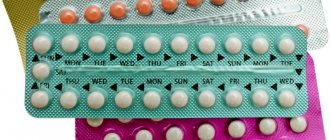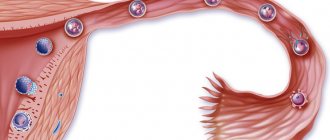Some women are interested in the question: can ovulation occur while taking birth control pills? The answer may be ambiguous. The effect of these drugs is to, figuratively speaking, “put to sleep” the ovaries and prevent the egg from breaking out.
As a result, the likelihood of fertilization is reduced to a minimum. However, there are cases when, regardless of taking contraceptives, pregnancy still occurs. Why does this happen, how do contraceptives work, and what happens if you stop taking the pills?
What are oral contraceptives and how do they work?
Most gynecologists say that taking oral contraceptives is the most reliable way to protect yourself from unwanted pregnancy.
Moreover, you can regulate them yourself. These drugs contain a synthetic hormone that blocks the ovulation process, preventing the follicle and egg from developing.
There are also drugs (popularly called mini-pills), the action of which is not aimed at blocking ovulation, but at thickening the cervical mucus.
It is located in a special canal of the cervix, which connects the vagina to the uterus.
During ovulation, female hormones act in such a way that the viscosity of this mucus decreases, making it easier for the sperm to pass through. Oral contraceptives (OK for short) make the mucus thicker, thereby blocking the path of sperm from the vagina to the uterus. Unlike the first option, these medications are less reliable, however, they have fewer side effects.
There are also drugs that primarily affect the sperm, reducing its motor activity when it enters the fallopian tubes.
Combination contraceptive pills, based on the amount of hormone, are divided into three types:
- Low dosage;
- Medium dosage;
- High dosage.
Is ovulation possible while taking birth control pills and after stopping them?
If a woman of reproductive age does not plan to become a mother in the near future, then, in the absence of contraindications, she is recommended to use hormonal tablet contraceptives that can protect the body from unplanned conception with an effectiveness of 98%.
Under the influence of certain factors, a woman may ovulate when taking birth control pills, the reason for which is non-compliance with medical recommendations or the presence of concomitant diseases of the reproductive system.
The main reasons for the onset of ovulation while taking tablet contraceptives will be discussed in detail below.
Operating principle OK
If we talk about whether another ovulation occurs when taking tablet contraceptives, then the activation of this process cannot be ruled out.
The mechanism of action of hormonal contraceptives on the female body directly depends on the type of tablet contraceptives.
These drugs are conventionally divided into combined oral contraceptives (COCs) and progestin drugs that do not contain estrogens.
Combined contraceptives
Combination medications such as Yarina, Janine, Klayra and Jess contain estrogen elements of natural or synthetic origin.
The main function of estrogens is to maintain the menstrual cycle, as well as prevent intermenstrual bleeding.
The mechanism of action of combined oral contraceptives is based on suppressing the growth of follicles and inhibiting the process of maturation and release of the egg into the abdominal cavity.
Progestin drugs
Progestin drugs do not have an estrogen component, and their effect on the female body is multidirectional. First of all, this group of contraceptives changes the degree of viscosity of cervical mucus, making it thicker, thereby making it difficult for sperm to enter the cervical canal.
In addition, progestin contraceptives act on the mucous membrane of the uterine cavity, preventing implantation of a fertilized egg. As a rule, the active ingredient of drugs from the group of gestagens is desogestrel. This powerful substance of hormonal nature, with minimal dosage, has a pronounced contraceptive effect.
Reasons for ovulation
There are several main reasons under the influence of which ovulation can occur with hormonal contraceptives. Among these reasons are:
- Failure to comply with the individually prescribed regimen for using a hormonal drug. Very often, women, due to lack of experience, do not adhere to the medical regimen for taking a hormonal drug, which was drawn up by the attending gynecologist. Against the background of changes in the balance of sex hormones, a woman may ovulate.
- Structural and functional pathologies of the gastrointestinal tract. If a woman has certain diseases of the digestive tract, then the process of absorption of the components of the product may be disrupted.
- Combined use of hormonal drugs with other groups of medications, resulting in a decrease in the effectiveness of birth control pills.
- Individual immunity to the prescribed drug. In some patients, ovulation occurs after discontinuation of OCs and while taking them if a particular drug is not suitable for the female body.
In addition, the contraceptive effect of hormonal tablet contraceptives can be reduced or eliminated when the tablets are used in combination with alcohol.
Important! If a woman has just started using a hormonal drug, then during the first ovarian-menstrual cycle, her body is not under reliable protection from the onset of an unplanned pregnancy. The reason for this is the insufficient accumulation of the active substance of the drug in the body, as well as the lack of necessary hormonal changes.
Effect on ovulation
Combined oral contraceptives have a significant impact on the process of maturation and release of the egg.
Unlike COCs, progestin contraceptives (mini-pills) do not affect the ovulation process in the female body, since their main effect is a change in the viscosity of cervical mucus.
During the entire period of taking combined oral contraceptives, the female body receives hormone replacement therapy, as a result of which the natural hormone-producing function of the ovaries is inhibited.
After discontinuation of COC use, the ovaries begin to produce hormones in significant quantities, which leads to the development of the so-called rebound effect . The essence of the rebound effect is a significant increase in female fertility and an increase in the likelihood of pregnancy during unprotected intercourse to the maximum.
The approximate time of ovulation after stopping birth control pills is individual for each woman. Some patients completely restore fertility within 3 months from the moment the drug is discontinued.
Not every woman can boast of a quick restoration of ovulation after taking birth control pills.
At least 60% of women of reproductive age can count on complete restoration of reproductive function within 6-12 months from the date of discontinuation of the contraceptive.
Possibility of ovulation and conception while taking OK
At least 2% of women taking hormonal contraceptive tablets experienced an unplanned pregnancy. Despite the high effectiveness of tablet contraceptives, there is a minimal percentage of the likelihood of ovulation occurring.
Women are at greatest risk during the first month of taking OCs.
That is why, during the first cycle from the moment of starting hormonal contraception, a woman is recommended to protect herself during ovulation, since the risk of an unplanned pregnancy is at least 50%.
What to do if there is no ovulation after taking OK?
The total duration of the stage of restoration of female fertility directly depends on the duration of taking oral contraceptives.
It takes us an average of 3 to 12 months to fully restore the hormone-producing function of the ovaries.
There is a separate theory according to which for every year of continuous use of contraceptive tablets, there are at least 3 months of rehabilitation.
The rate of restoration of fertility is influenced by factors such as the woman’s age, previous infectious and inflammatory diseases of the reproductive system, the presence of chronic diseases of organs and systems, as well as the state of the immune system. Often, women notice that after stopping the OC there is no ovulation.
If a woman does not become pregnant within 1 year after stopping the pill contraceptive, subject to regular attempts, then we are talking about probable infertility caused by ovarian hypofunction.
This condition occurs in rare cases when a woman has been taking hormonal pills continuously for a long period of time.
If there are no signs of ovulation within 12 months from the date of discontinuation of the drug, the woman will need additional therapy aimed at stimulating the hormone-producing function of the ovaries. You can recognize the restoration of fertility after taking OCs by the following characteristic symptoms:
- Painful sensations in the lower abdomen on the right or left.
- Increase in basal temperature.
- Increased sexual desire.
- The appearance of characteristic viscous transparent discharge from the genital tract.
The onset of ovulation can be recognized using ultrasound technology. During the diagnostic process, the growth of the dominant follicle will be determined. In addition, during a general gynecological examination, a characteristic expansion of the lumen of the cervix will be visualized.
There are also separate rapid tests that can detect egg maturation. You can do some of these tests yourself at home.
A few days before ovulation, the concentration of chlorides in the salivary fluid increases, which is due to the influence of estrogens.
Tests such as Your Cycle, EVA-TEST D, Maybe-MOM and OVU-test help determine this parameter.
Conclusion
Despite possible delays in the onset of pregnancy after long-term use of hormonal contraceptive tablets, this group of drugs does not have a negative effect on the process of intrauterine development of the child and the severity of the birth process. That is why OK are the most popular auxiliary method of family planning.
If a woman has violated the regimen for taking the tablet, she is advised to consult her gynecologist.
Source: https://ProKontraceptivi.ru/pill/ovulyatsiya/
What to do if there is no ovulation after taking contraceptives?
How much time a woman’s body needs to restore reproductive function depends on the duration of taking protective agents. If this period lasted for six months, then ovulation will most likely occur in the first menstrual cycle.
If a representative of the fairer sex has been drinking OCs without interruption for several years, the body may “forget” how to independently produce hormones for conception. Some gynecologists believe that the recovery period can be calculated as follows: 3 months for every year of taking the pills.
The speed of rehabilitation of reproductive function can be influenced by the state of the immune system, as well as age. The younger the woman, the less time she will need. Also of great importance is the fact whether the woman has children or has never given birth.
Reference: According to statistics, pregnancy after taking OCs occurs within a couple of years in 85% of women who have not yet given birth, and in 95% of those who already have children.
If more than a year has passed since you stopped taking the pills and ovulation does not occur, you should consult a doctor. You may need to use medications to stimulate ovulation or use additional reproductive technologies such as IVF.
Ovulation while taking birth control pills: myth or reality?
Birth control pills contain components that, when they enter the female body, are transformed into estrogen and progesterone.
And the entire menstrual cycle is regulated by these hormones. If the proper high dosage of female sex hormones is maintained in the blood, then ovulation simply will not occur and the egg will not be released. The body itself “believes” that it is pregnant.
And with it, as you know, the menstrual cycle practically stops. Only in the first 2 months there is a small probability of the onset of traditional ovulation and subsequent menstruation after the luteal phase.
REFERENCE! Birth control pills not only inhibit the release of the egg (and subsequently stop this process), but also make the walls of the uterus and fallopian tubes less smooth, thereby preventing sperm from moving through them. Also, taking hormonal drugs makes the mucus produced more viscous. That is, such products act comprehensively, thereby reducing the likelihood of fertilization by almost 99%.
When do birth control pills start working? Almost from the first day of admission. Many women note that in the first month from the start of the course they often experience false ovulation.
This is when the sensations are very similar, but the release of the egg still does not occur.
In most cases, this is a normal reaction of the body, but it is still worth consulting with your doctor about this.
The effect of birth control on ovulation
The main effect of contraceptives is aimed at inhibiting ovulation. Many such drugs are taken according to the 28x7 regimen, that is, after each course there is a short break.
Essentially, this is done to restore the normal course of the menstrual cycle. That is, for the onset of scheduled menstruation. But this does not in any way affect the likelihood of getting pregnant. The most important thing is to adhere to a clear schedule for taking such medications.
IMPORTANT! The chance of getting pregnant while taking contraceptives still exists, although it is quite negligible. According to statistics, it is approximately 3.4 cases per 1000 women (this does not depend on age). What is this connected with? With the individual physiology of the body and its reaction to an additional “dose” of sex hormones.
What happens during the appointment?
When taking modern contraceptives, ovulation stops completely and the menstrual cycle proceeds normally. But the menstruation itself is not pronounced, more often spotting, with a small amount of discharge.
Although this process also occurs purely individually. One has only to take into account that if menstruation is heavy, then you should consult with your doctor to prescribe other oral contraceptives.
Recovery after cancellation
But after stopping taking oral contraceptives, in almost all cases, so-called “hyperovulation” occurs. It is due to several factors:
- The ovaries quickly restore their functionality.
- There is a high probability of releasing several fertile eggs at once.
REFERENCE! It is believed that after abruptly stopping oral contraceptives, the likelihood of becoming pregnant with twins increases significantly. This is true, but the chance increases by literally 5-10%, no more, if you believe the statements of most gynecologists.
To avoid “hyperovulation”, doctors recommend not to suddenly stop taking contraceptives. First, replacement therapy is prescribed, then, if necessary, the woman takes a short-term course of taking synthetic hormones for the thyroid gland. All this will allow you to normalize the menstrual cycle and reproductive function in the shortest possible time.
It is believed that you should stop taking the pills before the onset of traditional menstruation. In this case, the functionality of the ovaries in the new cycle will be restored to its original state. And the likelihood of heavy bleeding in the next few cycles will be reduced to a minimum.
How long does the process of restoring ovulation take? Many women mistakenly believe that they need to stop taking oral contraceptives for about 2-3 months before planning to conceive. Doctors say that the recovery process is purely individual for each woman. For some, hormonal levels return to normal immediately, while for others it will actually take at least 3 months.
REFERENCE! How to find out the probability of ovulation after stopping taking birth control pills? The best option is to sign up for an ultrasound. Moreover, you will need to undergo 2-3 such examinations within the period prescribed by the doctor.
Overall, after stopping taking such medications, it is better to go for an examination with a gynecologist. If there are clear signs of hormonal imbalance, then at this stage it will be easiest to correct it. Moreover, conservative therapy without taking hormonal drugs will also help.
What do oral contraceptives affect?
OK, containing sex hormones, has a depressing effect on the process of cell formation, namely:
- inhibit the maturation of the egg;
- reduce contractility of the fallopian tubes;
- increase the viscosity of cervical mucus.
All this interferes with the fertilization process, since the cell is immature, and sperm in this state of the reproductive system cannot penetrate the tube. Changes in the endometrium do not allow the embryo to attach to its wall.
When taking OCs, sperm do not reach their target
If you want to get pregnant, stopping these medications is easy. It is only necessary not to abruptly stop taking it in the middle of the cycle, but to take the course before your period, so as not to cause too much bleeding. But restoration of reproductive function takes a sufficient period of time. Therefore, the question of when ovulation occurs after discontinuation of OCs remains quite relevant.
On average, the female body is able to return to normal and regenerate reproductive function from 6 to 12 months. In this case, the following factors play a role:
- age;
- state of the immune system;
- what contraceptive did you take;
- presence of diseases.
So, it’s difficult to say on what day ovulation will occur after stopping the OC, here the count goes on for months. Since the body received hormones in sufficient quantities while taking the pills, the production of its natural ones slowed down. And it takes time to restore the natural process. It is believed that each year of taking OCs adds 3 months to the recovery period.
Features of recovery after canceling OK
Experts believe that if you use contraceptives for 3 to 6 months, pregnancy can occur quite quickly. Since the ovaries, impaired in their productive function for some time, after the cessation of exposure to synthetic drugs, begin work on growing eggs with redoubled force.
Gynecologists even use this method of treatment for cases of failure in the process of cell formation. OCs are prescribed for 3 months to stimulate normalization of cell growth after their discontinuation. According to medical observations, pregnancy in such cases occurs after about 24 months in 85% of nulliparous women and in 95% of those who have given birth.
The first ovulation after stopping OK is an individual phenomenon. If impatient people believe that the release of the egg will occur immediately after stopping the medication, then this opinion is wrong.
A woman over 23 years old who has been protecting herself from pregnancy with hormonal pills for several years may need a year to recover. For a lady 30 years or older, the waiting period can last up to 5 years.
All processes depend on the state of the body during this period of time.
Painful ovulation is sometimes possible after discontinuation of OCs. But this is not observed often. The passage of the period without taking OCs occurs differently for each woman, with signs and sensations unique to her.
Since the recovery process is different for everyone, late ovulation is also possible after stopping OCs.
The woman’s reproductive system must again begin to reproduce hormones on its own when they stop coming in large quantities from the OC. The first months of such adaptation pass with disturbances in the rhythms of menstruation.
It lengthens significantly, thereby shifting the day of release of the reproductive cell. Adjusting this process may take 3 months or more.
When does ovulation occur after stopping OCs?
Calculations in case of rhythm failures do not give any results. Therefore, the moment of follicle rupture can be determined using saliva or urine tests, measuring the temperature rectally and keeping a graph of changes, as well as simply listening to your feelings. Breast tenderness and a slight nagging pain in the lower abdomen will tell you that the desired date has arrived, even if not at the moment you expected.
Source: https://yazdorov.win/venericheskie-bolezni/ovulyatsiya-pri-prieme-protivozachatochnyh-tabletok-mif-ili-realnost-3.html
When is it used?
Hormonal contraceptives have a wide spectrum of action. Doctors prescribe them not only to women who want to protect themselves from pregnancy. They are used as part of the complex treatment of many diseases of the female reproductive system, endocrine pathologies, and even for benign and malignant tumors. For example:
- Severe premenstrual syndrome.
- Hormonal infertility.
- Painful menstruation.
- Amenorrhea (when there is no menstruation).
- Pathological bleeding from the uterus due to hormonal dysfunction.
- Endometriosis (proliferation of endometrial cells beyond its boundaries).
When using hormonal contraceptives, you need to take into account all their functional features and take a responsible approach to planning pregnancy after their discontinuation.
Restoration of ovulation: when to expect?
The human body is a complex system, the work of which is clearly regulated. Any intervention, deliberate or not, can cause disruption of this precise mechanism.
OCs inhibit a woman's reproductive function. Gonadotropic hormones are not synthesized by the body, the ovaries are inactive. After their cancellation, reproductive function returns to normal, but not always quickly. How long to wait for ovulation?
This depends on a number of factors, including the duration of taking the pills.
Taking OK 3–6 months
The probability of ovulation in the first cycle after discontinuation of OCs, provided they are used for a short time (3–6 months), is high. This is called the Rebound Effect (or Cancellation Effect). It is often used by gynecologists in the treatment of patients suffering from hormonal infertility.
The essence of the Rebound effect is enhanced ovarian function after a certain period of inactivity and, as a result, a significant increase in the likelihood of conception.
From the beginning of taking OCs, the natural function of the ovaries is blocked due to inhibition of the hypothalamic-pituitary system. After their cancellation, the ovaries begin to function in an enhanced mode, which increases the likelihood of ovulation. In addition, often not one, but several follicles mature at once, which is favorable for conception.
The rebound effect does not last long - a maximum of 3 months after stopping OK. It is important to note that it is used only in women who, due to certain circumstances, cannot conceive. The decision to use contraceptive pills for this purpose is decided by the gynecologist.
Interesting fact: after using the Rebound effect, the chances of giving birth to twins or even triplets increase.
Taking OK for up to several years
The situation is completely different for those who have been drinking OK for a long time.
If a woman has not taken a break for several years, her body may simply forget how to synthesize its own hormones necessary for conception.
It takes time for the body to begin producing sex hormones again. In general, experts are of the following opinion: for every year of taking OCs, 3 months of recovery are required.
An important role in restoring ovulation is played by the state of a woman’s immunity, the presence of congenital or acquired pathologies, as well as age.
If she is young (under 23 years old), then she may need very little time to restore her body. Some representatives of the fair sex experience ovulation already in the first month after withdrawal. But this is rather an exception to the rule.
If a woman is over 30 years old, then ovulation may occur in a year, or even several years.
Statistics show that the average time for complete restoration of reproductive function after discontinuation of OCs ranges from six months to a year. Pregnancy occurs within two years in 85% of nulliparous women and in 95% of those who have given birth.
Gynecologists advise women who have been taking contraceptives for a long time not to rush into pregnancy after stopping them. If you wait about 3 months before conception, the body will fully recover and hormonal levels will normalize.
On what day does ovulation occur?
Many people are interested in what day will ovulation occur after stopping the OC? It depends on the length of the cycle. As a rule, it occurs 12-14 days before menstruation. Thus, if a woman’s cycle length is 30 days, then the egg will mature at approximately 16–18 days.
There are, however, late or early ovulations. Both of these phenomena are the norm, although they are not entirely convenient for both the woman and the doctors; they confuse them about the duration of pregnancy. If a woman had early ovulation before taking OCs, it is possible that after stopping them she will also do so, but a change in cycle length is also possible.
To find out approximately when the favorable time for conception will come after stopping hormonal pills, it is recommended to do an ultrasound. The doctor will determine the dominant egg and make preliminary predictions about the timing of its maturation. For accuracy, ultrasound is performed several times on days specified by the gynecologist.
You can determine ovulation using saliva or urine tests, as well as measuring your basal temperature and recording it on a chart. A woman will understand the arrival of the long-awaited day by her feelings. A slight nagging pain in the lower abdomen, tenderness of the mammary glands will tell you that the time has come to conceive a baby.
Source: https://zdorovo.live/ginekologiya/ovulyatsiya-pri-prieme-protivozachatochnyh-tabletok-mif-ili-realnost.html
Who should not use OK?
Contraceptive medications help avoid unplanned pregnancy. However, not everyone can use them. Here are several aspects in which it is contraindicated to take drugs of this type:
- Smoking;
- Liver and kidney diseases;
- Thrombosis;
- Diabetes;
- Moderate to severe hypertension.
In addition, it is not recommended to use OCs for a month and a half after childbirth, before a planned operation, if there is complete immobility and there is a possibility of pregnancy.
As for the lactation period, you should not use combined drugs, because they increase the level of the hormone estrogen and have a detrimental effect on the production of breast milk. Progestogen pills (mini-pills) contain only progesterone or gestagen. They do not affect the amount of milk in any way and do not harm the baby. Their use is not prohibited.
We invite you to watch a useful video on the topic:
What causes ovulation?
After taking birth control pills, conception sometimes occurs. This happens if any factors had a negative impact during contraception.
May affect:
- violation of the dosage regimen;
- simultaneous use of OK with other drugs;
- using a mini-pill;
- drinking herbal teas;
- improper functioning of the gastrointestinal tract;
- an incorrectly selected drug in a particular case.
If you take pills recklessly, without taking into account the days and hours, forgetting about the doctor’s words and without looking at the instructions, the woman will not be reliably protected. It should also be taken into account that in the first cycle there is still no reliable protection, since the medicine has not yet accumulated in sufficient quantities and has not been able to block hormones that affect the release of the egg and the maturation of the follicle. If you miss even one dose, there is a chance that ovulation will begin after that. The active substance can be completely washed out during the day.
Sometimes the concurrent use of certain drugs also affects the effect of OCs. Some can have a diuretic effect, which leads to the rapid removal of the contraceptive from the body; it does not even have time to be absorbed. Others are incompatible with the composition of OK. In such cases, they simply have no effect.
If a woman has any pathology related to the gastrointestinal tract or endocrinology, then contraceptives may be powerless, because the treatment of such diseases involves taking hormonal drugs and adsorbents. As a result, the active substance is not absorbed in the required quantity. This is not enough to stop the development of the follicle, so ovulation begins.
Those who drink mini-pills should know in advance that they do not stop the growth of the follicle, but simply change the consistency of cervical discharge. This in turn prevents the sperm from reaching the egg. If a woman drinks alcohol, smokes, gets nervous a lot, or engages in vigorous physical activity, the viscosity of the mucus may decrease, which will lead to pregnancy. With prolonged diarrhea or vomiting, the active component is also removed from the body.
Some medicinal plants that women drink as tea also interfere with the effects of birth control pills. Tansy or St. John's wort can reduce the activity of the active ingredient. All diuretic herbs wash away the medicine at lightning speed, so it has zero effect.
Usually those ladies who decide to start drinking OK at their own discretion cannot correctly determine the dosage. This, in turn, has no effect on the follicles and ovulation occurs when taking OCs. To obtain the desired result, you should first consult with a specialist.
In some cases, when ovulation is still present, the drug is not suitable for the woman. There is only one way out - stopping the medication. What follows is selected more carefully.
conclusions
As you can see, birth control pills cannot provide a 100% guarantee that fertilization will not occur. To fully protect yourself, you need to use additional methods.
But first of all, it is important to contact a specialist to get a full consultation, because oral contraceptives are serious drugs that affect the functioning of hormones. If, nevertheless, ovulation occurred while taking birth control pills, and the woman felt that she was pregnant, the OC should be abandoned so as not to inadvertently harm the baby.
When does ovulation begin after stopping the drug?
After birth control pills have been stopped, ovulation occurs in different ways. For some, after a three-month course it appears immediately. This rebound effect helps older women get pregnant. In some cases, doctors specifically prescribe an OK course to their patients. As a result, after discontinuation of the drug, ovulation occurs in 80%.
But not everyone has this result. For those women who took the medicine for more than six months, ovarian function is suppressed and they have to wait 3 months or more until everything is restored. OK are hormonal drugs, so they change a woman’s hormonal background. In order for everything to return to normal, sometimes you have to seek the help of a specialist. If you do not go to the hospital in a timely manner, the situation will worsen, and infertility may occur, which will take much longer to treat.
What happens to the body after stopping OK?
When using oral contraceptives, the body received hormones. After the use of the drug has stopped, the ovaries begin to work normally, secreting their own hormones.
This process of restructuring the body, in which it is in a “state of shock,” can be called “withdrawal syndrome.”
Every body is different, so some may experience the following symptoms:
- Menstrual irregularities . This may occur due to the fact that the ovaries have not yet had time to adjust to independent work, so there are temporary delays in the production of hormones. Women who had menstrual irregularities before OC are especially susceptible to this symptom. Over time, everything should return to normal, and the cycle will last 21-36 days.
- Mood can change dramatically . It's all about hormones here too. To improve your emotional state, it is recommended to engage in moderate physical activity and take vitamins such as folic and ascorbic acid.
- Hair changes its structure, falls out a lot and quickly becomes oily. Pimples, blackheads appear on the skin, and even pigmentation increases. The reason for this is the increased concentration of the male sex hormone androgen, the content of which was normalized by contraceptive drugs. If there were no such symptoms before taking OK, then after taking the pills they will go away after 2-3 menstrual cycles.
- Appetite may increase. If you do not control the amount of food you eat, you can quickly gain weight.
- There is pain in the lower abdomen and vaginal discharge. However, after time (2-3 cycles) this symptom should go away.
When can you plan to conceive?
When using contraceptives for the treatment of hormonal infertility, conception should be planned immediately after their discontinuation. It should be taken into account that during this period several eggs can mature at once. Therefore, the chances of multiple pregnancy increase.
When taking OCs for a long time, you must initially restore your hormonal levels. In addition, you should saturate your body with vitamins and undergo an examination. As a rule, vitamin and mineral complexes containing the following substances are prescribed:
Three months after discontinuation of the drug, the body compensates for the lack of useful elements, and the ovaries begin to function normally. At the same time, a favorable period begins for planning a pregnancy. However, it must be taken into account that the speed of recovery is affected by the woman’s age and the duration of taking contraceptives. Sometimes the doctor recommends waiting a longer period.
What determines the recovery period?
The time frame within which ovulation can be restored after stopping OCs largely depends on the reason for starting to take them. If a woman took pills to protect against unwanted pregnancy, the recovery period will be shorter than in the case of hormonal imbalance.
There are also a number of factors that influence the timing of the onset of ovulation after taking birth control pills:
- presence of gynecological diseases;
- incorrectly completed course of treatment;
- age;
- scheme and duration of contraceptive use;
- type of drug used;
- underweight and overweight;
- accompanying pathologies.










